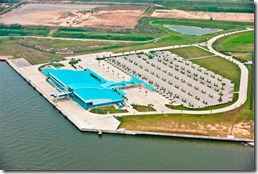 Houston has had its share of urban boondoggles.
Houston has had its share of urban boondoggles.
But for sheer boondogglery, the Port of Houston’s Bayport Cruise Ship Terminal may take the cake.
In so doing, it teaches us a valuable lesson for evaluating other potential boondoggles.
Years before the recent Houston Chronicle article, the Bayport Terminal’s story was well-known.
Clueless Port Commissioners authorized the expenditure of over $108 million to build the terminal on the Houston Ship Channel. The decision was dubious from the start.
First, the Commissioners spent taxpayers’ money without a commitment from any cruise lines to dock at the new terminal.
Moreover, they committed those funds when it was clear from the outset that it was much more profitable for cruise lines to dock a short ride down the road at the Port of Galveston, where ships could dock from, and depart into, the Gulf of Mexico. That saved the cruise lines the considerable time, risk and cost of traversing the Houston Ship Channel to dock at the Bayport Terminal.
So, the terminal sat completely empty for five years or so after construction was finished in 2008.
Then, the Port Commissioners compounded their boondoggle by giving in to the sunk cost fallacy.
Rather than simply walking away from the financial disaster, the Commissioners threw an additional $7 million or so at a couple of cruise lines to induce them to use the terminal.
The result? The terminal is still losing over a couple of million dollars annually. And now the cruise lines are pulling out because even Port of Houston-subsidized cruises from Bayport are not as profitable as those that depart from Galveston.
Now, that’s a boondoggle!
But what’s the lesson, you say?
Well, Harris County Commissioners are still trying to figure out what to do with the obsolescent Astrodome.
I use the word “still” because the Commissioners have been dithering over what to do with the Dome since before I started this blog in early 2004. Their machinations have been the subject of a dozen or so posts on this blog over the years.
And let me say at the outset that I really like the Dome. It is an iconic structure and helped put Houston on the world map. Along with the Texas Medical Center, NASA, the oil & gas industry, the Port of Houston, the Houston Ship Channel, Houston Grand Opera, the Museum of Fine Arts, Houston Ballet, the Houston Symphony, the Alley Theater, the Rothko Chapel, the Menil Art Museum, Rice University, the University of Houston, the Galleria, etc.
You get my point – the Dome is an important part of Houston’s legacy.
But it’s still only a part of that very large legacy.
In my view, the main problem with the Dome is that its fate sits in the hands of County Commissioners, who have consistently made unwise decisions in managing the Dome throughout its existence.
Recently, County Judge Ed Emmett, a well-intentioned fellow, has proposed a nebulous public-private partnership to raise $250 million or so in donations to renovate the Dome into an indoor park that could host events and festivals year-round.
As is usually the case with boondoggles, the financial details of Emmett’s proposal remain sketchy. Nevertheless, Emmett is reasonably sure that the money can be raised.
Maybe so. But – as with the Bayport Terminal – who is going to pay the almost certain operating deficits of the Dome after the renovation is complete?
One of the problems with projects such as the Dome or the Bayport Terminal is that they “eat” money — air-conditioning a space as large as the Dome is not cheap.
And what is Emmett’s financial model for his Dome venture? No word on that yet.
So, the lesson. Remember to ask yourself Peter Gordon’s three elegantly simple questions when confronted with government projects such as renovation of the Dome:
1) At what cost?
2) Compared to what? and
3) How do you know?
If we answer those questions honestly – and require the Commissioners to do so as well – perhaps we can avoid having the Dome join the Bayport Cruise Terminal as one of Houston’s biggest – and most embarrassing — urban boondoggles.
Like this:
Like Loading...

